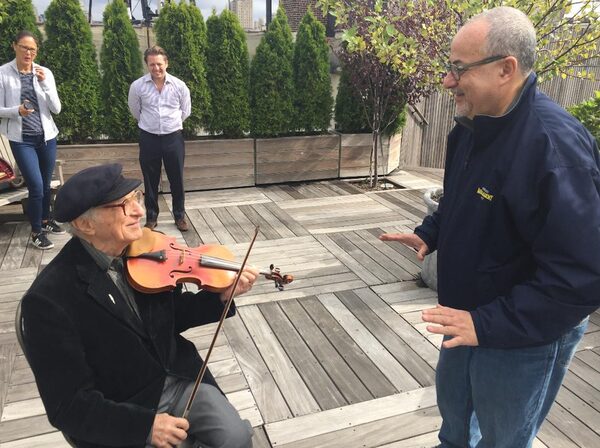
Montreal-born documentary filmmaker Max Lewkowicz and Sheldon Harnick, the lyricist of Fiddler on the Roof.Courtesy of Max Lewkowicz
You don’t need to be Jewish to sing “biddy biddy bum.”
In his review of Norman Jewison’s 1971 film version of the popular stage musical Fiddler on the Roof, Roger Ebert wrote that the “problem with Fiddler” was that it was too far away from the roots of its original story. “It might as well be moved to Ireland, where the peasants could grow potatoes instead of corn,” griped the Pulitzer Prize winning critic from the Chicago Sun-Times. “Every ethnic group on Earth shrugs its shoulders and has a special relationship with God and is philosophical about things and wants its kids to marry the correct person in the correct way.”
That’s all true. It’s also why the story and the stage musical, which opened in 1964, is so outrageously popular and enduring. It’s relatable. Two thumbs down for the illustrious Mr. Ebert.
“Exactly,” says Max Lewkowicz, the Montreal-born documentary filmmaker, speaking from his home on Manhattan’s Upper West Side. “It’s not a Jewish story. It’s universal.”
Lewkowicz is the director of Fiddler: A Miracle of Miracles, a lively, thoughtful new doc which tells the origin story of Fiddler on the Roof. The film makes its world premiere on Wednesday at the Toronto Jewish Film Festival. Vancouver distributor Pacific Northwest Pictures recently picked up the Canadian rights to the documentary, which is slated for a Canada-wide release on Aug. 9.
When reviewer Ebert wrote about the roots of the Fiddler story, he was referring to Tevye the Dairyman, a series of stories by Sholem Aleichem about small-town Jewish life in Czarist Russia at the turn of the 20th century. Originally written in Yiddish, the tales revolved around a good-willed Ukrainian milkman and his troublesome daughters of marriageable age. Anyone with even a passing familiarity of Broadway show tunes is aware that Tevye was not a rich man.
The deeper story is “camouflaged,” in the words of Lewkowicz, whose 2016 HBO documentary Underfire: The Untold Story of Pfc. Tony Vaccaro uncovered the exploits of a camera-toting combat infantryman in the Second World War. “Fiddler on the Roof is not what it seems,’ he says. “Below the surface, what so many people relate to around the world is the basic elements of the human condition.”
Lewkowicz’s Fiddler: A Miracle of Miracles is so titled because of the miraculous following the musical has achieved since the original Broadway production opened at the Imperial Theatre on Sept. 22, 1964, Before that premiere, financial backers and media wags were skeptical of the musical’s prospects, reasoning that it was too ethnic to find a mainstream audience. Upon seeing a tryout version of Fiddler at Detroit’s Fisher Theatre, a Variety critic savaged the musical: “None of the songs are memorable,” he sniffed.
Shaw Festival revives Mae West’s racy Broadway hit Sex
World’s first Indigenous Theatre will bring first people’s languages to national audience
David Alden’s Otello combines enthralling characters with excellent singing

The Norman Jewison-directed film version of Fiddler on the Roof took home three Academy Awards.Courtesy of the Toronto Jewish Film Festival
As it happened, if that critic had invested money in Fiddler instead of panning it, he would have been singing a different tune – as in, If I Were a Rich Man. In their book Broadway: The American Musical, Michael Kantor and Laurence Maslon wrote that the production (starring Zero Mostel, and directed and choreographed by Jerome Robbins) earned $1,574 for every dollar invested in it.
Grabbing nine Tony Awards, Fiddler had the first musical theatre run in history to surpass 3,000 performances. It spawned five Broadway revivals and, as mentioned, the Jewison-directed film, which starred Israeli actor Chaim Topol and took home three Academy Awards.
Besides the gaudy box office and juicy backstage stories – Mostel loathed Robbins, we learn – Lewkowicz was interested in the musical’s soul.
“I still cry when I see it,” he says. “So do a lot of people. I wanted to find out why.”
Using archives and interviewees (including 93-year-old Sheldon Harnick, the lyricist of Fiddler on the Roof), the documentary weaves a contextual chronology from 1905 and the violent persecution of Jewish people, to the societal upheaval of the 1960s to the relevant human struggles – refugees, women’s rights – of today. Themes covered include family values and the loss of traditions and cultural identity.
On a personal level, Lewkowicz was affected by the relationship of the milkman and his three daughters who resist the Matchmaker, Matchmaker tradition of arranged marriages, no matter how darn catchy the song is. “I look around today, and I see how woman are taking control of their lives,” Lewkowicz says. “As a father of two daughters, that part of Fiddler really gets to me.’
Tears, toe-taps and biddy-biddy-bums too. Maybe the success of Fiddler on the Roof wasn’t such a miracle at all.
Fiddler: A Miracle of Miracles premieres on May 8 at Toronto’s Hot Docs Ted Rogers Cinema, as part of the Toronto Jewish Film Festival (May 2 to 12).
 Brad Wheeler
Brad Wheeler